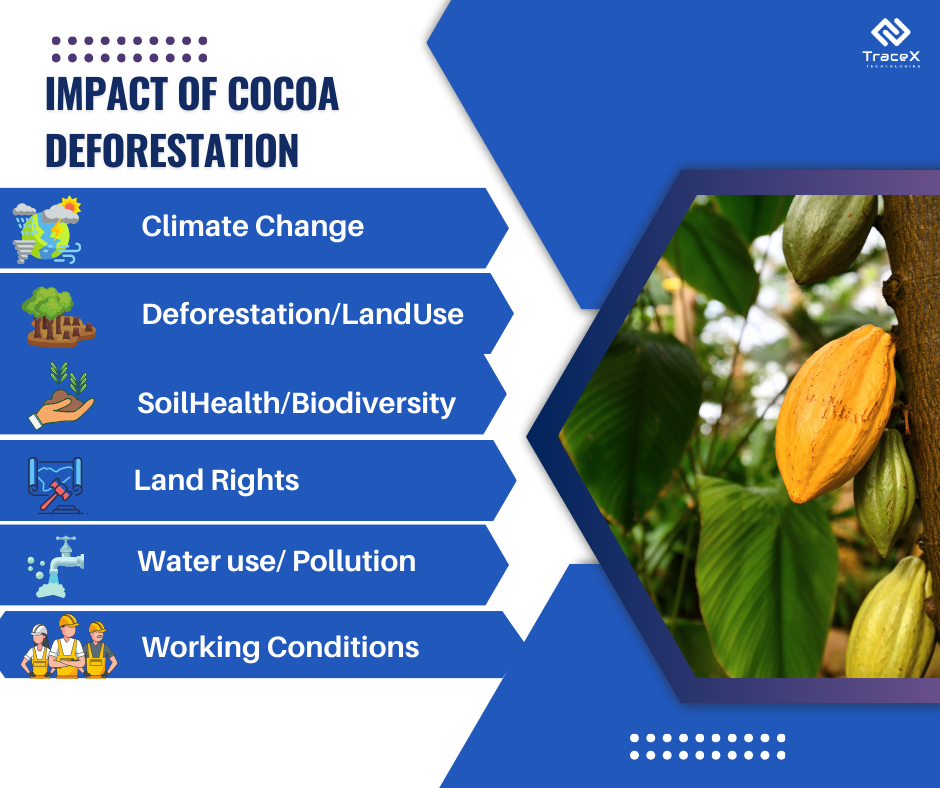Contact: +91 99725 24322 |
Menu
Menu
Quick summary: Explore the complexities of deforestation in cocoa supply chains, unveiling the environmental and social challenges within the industry. Delve into the impacts, regulations like EUDR, and innovative solutions driving sustainable cocoa production.

We all love the rich taste of chocolate, but have you ever wondered about the environmental cost behind every bite? Unfortunately, chocolate has a dark side—Cocoa deforestation. In many regions, vast forests are cleared to make way for cocoa farms, putting ecosystems, wildlife, and even local communities at risk. For chocolate producers, this creates a serious challenge: How do you meet consumer demand for ethical products while ensuring that your supply chain isn’t contributing to deforestation? The reality is, sourcing cocoa sustainably is harder than it sounds, but it’s a challenge that can’t be ignored any longer.
The global cocoa industry, primarily centered in West Africa, faces a stark reality. Approximately 75% of the world’s cocoa originates from this region, predominantly from leading producers such as Côte d’Ivoire and Ghana.
The bitter truth lies in the deforestation haunting cocoa supply chains, an environmental price paid for our sweet cravings .Join us on a journey to unmask the realities behind your beloved cocoa treats uncovering the challenges, consequences, and the imperative need for sustainable practices in cocoa production.
Key Takeaways
Cocoa serves as a vital cash crop for farmers in West Africa, many of whom possess only small plots of land and cannot afford to buy chocolate. However, the cultivation of cocoa is contributing to serious issues in the region. Farmers often clear tropical forests to cultivate new cocoa trees rather than utilizing existing land. This approach has led to significant deforestation in West Africa, especially in Ivory Coast. Experts believe that about 70% of the country’s illegal deforestation is connected to cocoa
Cocoa stands as a global commodity, vital for the multibillion-dollar chocolate industry. It is not merely an ingredient; it shapes economies, provides livelihoods for millions, and delights taste buds worldwide.
The processing of cocoa beans takes place across the globe, with 40% of cocoa beans ground and processed in Europe and the remaining 60% of the market is shared among Africa, Asia and the Americas.
Throughout history, deforestation caused by cocoa cultivation in these areas has been influenced by various factors. These include the lack of a clear land and tree tenure system, ineffective legal frameworks, and government policies that encourage increased production. The situation is worsened by a lack of resources, soil degradation, and farmers’ inclination to utilize recently deforested lands for nutrient-rich soils.
Hence, the issue of deforestation is intensified by diminishing productivity caused by suboptimal farming methods. Consequently, farmers resort to clearing more forested areas to expand their production zones, despite the absence of an overall increase in production. This situation has resulted in internal migration to forested regions, where deforestation occurs for new cocoa cultivation. The economic advantages of planting cocoa in recently cleared forest lands outweigh the benefits of replanting in existing farms in the short term.
Cocoa farming practices often contribute to deforestation as farmers expand their plantations into forested areas. This expansion involves clearing land through slash-and-burn methods, leading to extensive deforestation. The high demand for cocoa incentivizes this unsustainable agricultural expansion, posing significant environmental threats and emphasizing the imperative for adopting more sustainable and forest-friendly cocoa farming practices.
Deforestation free supply chains have evolved from being merely an ethical obligation to becoming a crucial business requirement. Firms dependent on agricultural products now confront dual challenges of resource shortages and increasing regulatory demands.
Increased cocoa demand, driven by the global chocolate industry, fuels the expansion of cocoa plantations. This demand intensifies pressures on tropical forests, contributing to illegal logging and land clearance for cocoa farming. As farmers seek to meet market demands, they often resort to unsustainable practices, accelerating deforestation. Addressing these factors necessitates a holistic approach, involving sustainable farming practices, responsible sourcing, and consumer awareness to break the link between cocoa production and deforestation.
Deforestation in cocoa-producing regions carries severe environmental and social consequences. It leads to biodiversity loss, soil degradation, and disrupted water cycles, affecting local ecosystems. Additionally, deforestation often displaces indigenous communities, contributing to social injustice. Sustainable cocoa farming is crucial for mitigating these impacts, preserving biodiversity, and ensuring the well-being of both the environment and the people dependent on cocoa production.

Deforestation in cocoa-producing regions leads to habitat loss and a sharp decline in biodiversity. Indigenous flora and fauna lose their homes, disrupting ecosystems. This ecological imbalance affects pollinators, soil quality, and water cycles, emphasizing the urgent need for sustainable cocoa farming to preserve the rich biodiversity of tropical regions and maintain ecological harmony.
Deforestation in cocoa supply chains intensifies climate change by releasing stored carbon dioxide into the atmosphere. Trees act as carbon sinks, and when cleared for cocoa farming, this stored carbon is released, contributing to greenhouse gas emissions. The resulting imbalance accelerates global warming, emphasizing the critical role of sustainable cocoa practices in mitigating climate impacts.
Deforestation in cocoa-producing areas often displaces local communities, robbing them of their homes and livelihoods. Indigenous populations dependent on forests for sustenance face economic hardships, contributing to social injustice. Sustainable cocoa farming practices are essential to mitigate these impacts, ensuring the well-being and stability of local communities.
Deforestation in the cocoa industry often intertwines with issues like child labour and fair trade. As demand for cocoa intensifies, farmers may exploit labour, including children, in unsustainable practices. Embracing fair trade principles becomes crucial to breaking this cycle, promoting ethical treatment, and sustainable practices, and ensuring a just and transparent cocoa supply chain.
The cocoa supply chain is intricate, involving numerous hands before reaching supermarket shelves. Cocoa from various farmers, mainly smallholders, is blended at multiple stages, hindering traceability to individual farms—the source of most supply chain risks. This complexity also contributes to inequities along the value chain.
Despite its extensive nature, most corporate sustainability reporting does not account for indirect sourcing. Take, for instance, the Cocoa & Forests Initiative (CFI), a multi-stakeholder collaboration involving the Ivorian government and 35 major chocolate companies and cocoa traders responsible for over half of Côte d’Ivoire’s cocoa exports. While CFI members submit annual reports on sustainable sourcing, these reports only cover directly sourced volumes.
Cocoa production has been a significant driver of deforestation, especially in countries like Côte d’Ivoire and Ghana, where forests are cleared to expand cocoa farms. The new EU Deforestation Regulation (EUDR) aims to address this issue by requiring companies to prove that their cocoa supply chains are free from deforestation. Compliance with EUDR means chocolate producers must ensure that their cocoa is sourced sustainably, using traceability solutions to track the origins of their cocoa beans and verify that no forests were harmed in the process. This regulation is a game-changer for the cocoa industry, pushing it toward more sustainable and transparent practices.
The TraceX EUDR Compliance Platform is playing a pivotal role in helping the cocoa industry meet the stringent requirements of the EU Deforestation Regulation (EUDR). By leveraging blockchain technology, the platform provides end-to-end traceability across the entire cocoa supply chain, ensuring that every step—from farm to finished product—is transparent and verifiable. With real-time data access and immutable records, businesses can track the exact origin of their cocoa beans and confirm that no deforestation occurred during production.
In addition, the platform integrates seamlessly with existing systems, making it easier for companies to collect the necessary documentation and evidence to prove compliance. By doing so, TraceX not only helps companies avoid hefty fines and penalties but also enables them to build consumer trust and contribute to sustainable cocoa production.
Chocolate manufacturers and cocoa producers are increasingly committed to addressing deforestation. Many have pledged to source sustainably certified cocoa, supporting agroforestry practices that integrate cocoa cultivation with forest conservation. Initiatives include farmer training programs, reforestation projects, and partnerships with NGOs. Certifications like Rainforest Alliance and Fair Trade indicate efforts toward ethical and environmentally friendly cocoa production, signalling a positive shift toward a more sustainable chocolate industry.
Certification programs like Rainforest Alliance and Fair Trade play a pivotal role in promoting sustainable cocoa production. They establish standards for environmental conservation, fair labour practices, and community well-being. Cocoa farmers adhering to these certifications are incentivized with better prices, fostering sustainable practices. Consumer awareness of these labels encourages ethical choices, creating a market demand for responsibly sourced cocoa and driving positive change in the chocolate industry.
Consumer choices and awareness wield significant influence in driving change in the cocoa industry. Informed consumers, by preferring products with certifications like Fair Trade or Rainforest Alliance, create demand for sustainably sourced cocoa. This consumer-driven demand encourages chocolate manufacturers to adopt ethical and environmentally friendly practices. As awareness grows, the industry responds, leading to a positive cycle where responsible consumer choices catalyse broader changes toward a more sustainable cocoa supply chain.
A lack of transparency about deforestation in the cocoa supply chain is creating reputational and regulatory risks for commodity traders and chocolate manufacturers.
The future of sustainable cocoa production relies on unwavering commitment to complete supply chain traceability and transparency. To ensure deforestation-free, EUDR-compliant cocoa, time is of the essence. Farm-level traceability, linking geo-located farmland to transaction history, is crucial for audit-proofing your cocoa supply chain. Traditional certifications and spot audits fall short; real-time visibility is essential for maintaining an ethical cocoa supply chain for your brand.
Numerous major cocoa companies globally remain exposed to the risk of procuring cocoa associated with deforestation. As the European Union Deforestation Regulation enforcement looms, chocolate companies must promptly and decisively act to mitigate deforestation in their supply chains, as failure to do so could result in sanctions for non-compliance.
The expectation is clear: there is no longer tolerance for anything less than 100% deforestation-free cocoa and comprehensive deforestation mapping.
Cocoa farming contributes to deforestation when forests are cleared to make way for cocoa plantations, particularly in West African countries like Côte d’Ivoire and Ghana. As demand for cocoa grows, farmers often expand into forested areas, leading to habitat loss, biodiversity decline, and increased carbon emissions.
Cocoa deforestation leads to severe environmental impacts, including loss of biodiversity, disruption of ecosystems, and increased greenhouse gas emissions. Forests play a critical role in regulating climate and providing habitats for wildlife. When these forests are destroyed, the natural balance is disrupted, and communities dependent on these ecosystems are adversely affected.
The EU Deforestation Regulation (EUDR) requires companies to prove that their cocoa products are sourced from deforestation-free supply chains. By mandating traceability and transparency, the EUDR aims to reduce deforestation linked to cocoa farming, ensuring that companies only use cocoa beans from sustainable and legal sources.
